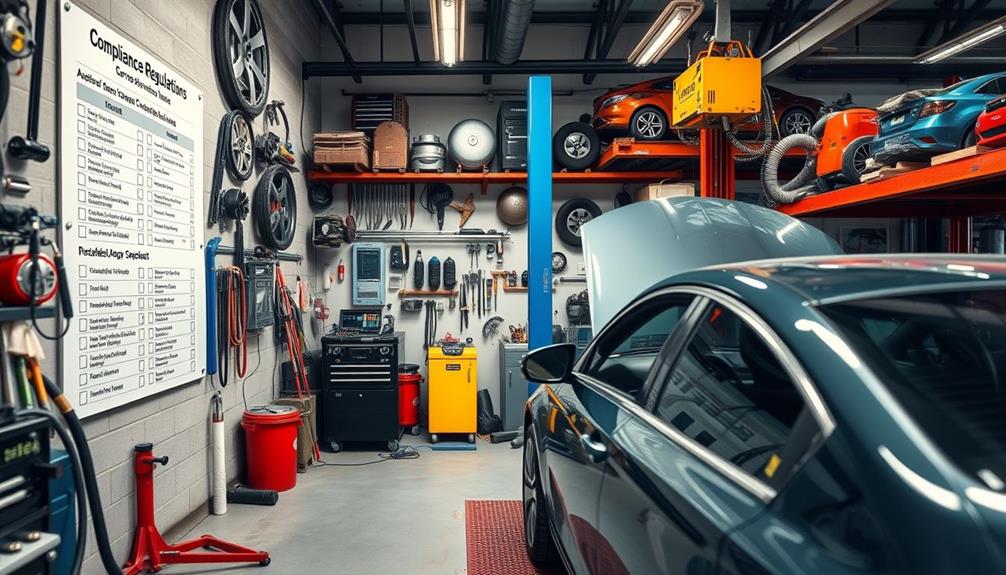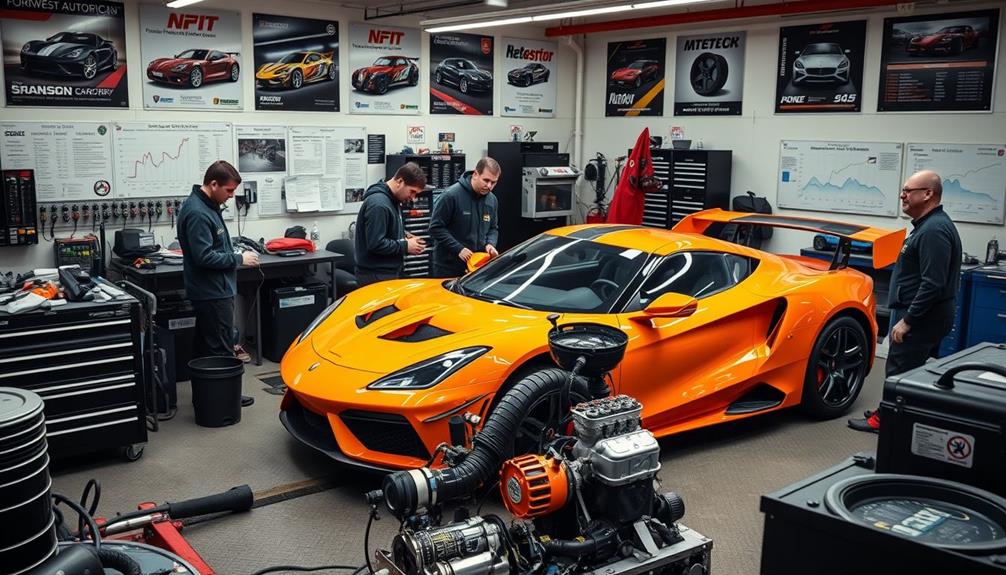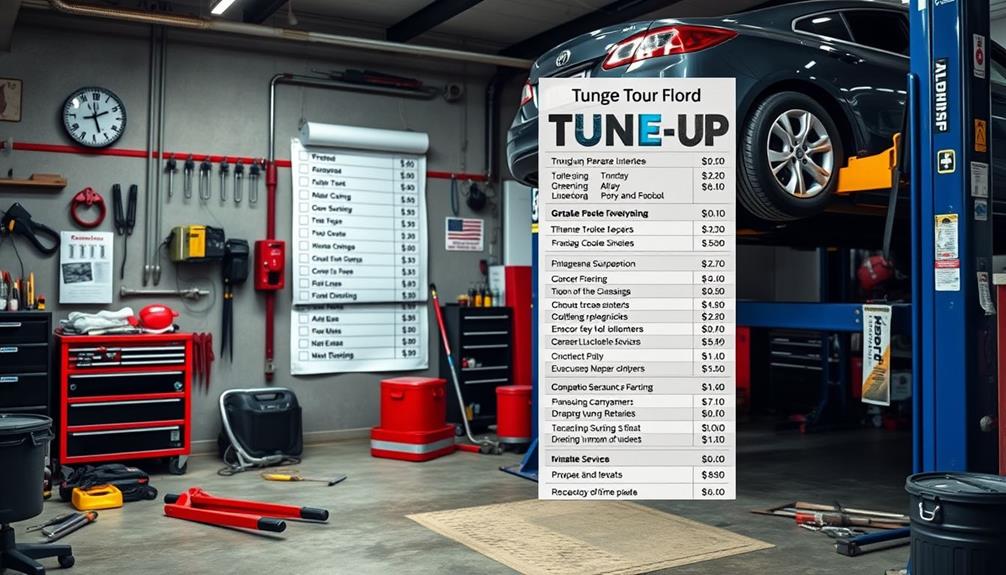Car tuning can be an exciting career if you're passionate about cars, but it has its pros and cons. You'll enjoy hands-on learning, community engagement, and potential earnings between $50,000 and $100,000 annually. However, job stability might be a concern, especially with the rise of electric vehicles. You also face high initial costs, competitive customer service demands, and regulatory hurdles. If you've got the right skills and are ready to navigate these challenges, tuning can be fulfilling. There's much more to reflect on about this career path, so keep exploring the intricacies of what's involved.
Key Takeaways
- Car tuning offers high earning potential, with skilled tuners making between $50,000 to $100,000 annually, but job stability can be uncertain due to industry shifts.
- The hands-on nature of car tuning allows for continuous skill development and practical experience, fostering passion for automotive work.
- Significant initial investments in equipment, such as dynos, can range from $30,000 to $100,000, impacting financial viability.
- Intense competition necessitates strong customer service and marketing skills to maintain client satisfaction and loyalty.
- Regulatory compliance regarding emissions and local laws can complicate operations and require ongoing monitoring.
Overview of Car Tuning Career
Starting on a car tuning career can be both exciting and rewarding. If you're a car enthusiast, diving into this field allows you to combine your passion with your profession. As you begin your career in car tuning, you’ll have the opportunity to work on a variety of vehicles and explore different techniques and modifications. With dedication and continued learning, you can become a car tuning expert and gain the skills and knowledge to transform vehicles into high-performance machines. This career path provides endless opportunities for growth and satisfaction as you see the impact of your work on the performance and appearance of cars.
Car tuning isn't just about modifying vehicles; it requires a solid understanding of automotive principles and hands-on experience. You'll need to stay updated on the latest technologies, especially with the rise of electric and hybrid vehicles, which are becoming increasingly popular.
As the demand for automotive tuning services grows, particularly in areas with a vibrant car enthusiast culture, the career opportunities are promising. Skilled tuners can earn between $50,000 to $100,000 annually, depending on your experience and clientele. This financial potential adds to the appeal of pursuing a career in this area.
Networking plays a vital role in your success. Engaging with the automotive community, attending local events, and joining tuning clubs can enhance your visibility and client base.
Pros of Pursuing Car Tuning

Diving into a car tuning career can offer you immense job satisfaction, as it lets you blend your passion for automobiles with technical know-how.
As a car enthusiast, you'll thrive in an industry that's in high demand, particularly in areas with few skilled tuners. This creates a wealth of opportunities for you to establish a successful career.
Here are some compelling pros of pursuing car tuning:
- Increased Performance: You'll help clients achieve their desired vehicle performance, enhancing driving experiences.
- Financial Rewards: Skilled tuners can command high prices for their services, leading to significant earnings.
- Hands-On Learning: Tuning allows you to develop skills through practical experience and ongoing education, keeping you engaged in your craft.
- Community Engagement: Connecting with fellow enthusiasts through clubs and events enriches your passion and expertise.
- Networking Opportunities: Building valuable connections with other professionals can open doors for collaborations and new clients.
Cons of Car Tuning as a Career

A career in car tuning, while rewarding, comes with its fair share of challenges that can complicate your journey. One major issue is the industry's shift away from internal combustion engines, raising concerns about long-term job stability and market viability.
As an aspiring tuner, you'll face high costs upfront, whether it's investing in equipment like a dyno or steering through insurance and compliance requirements. These financial barriers can deter many from entering the field.
Additionally, customer service demands can be intense. In a competitive landscape with limited tuners available, maintaining client satisfaction is vital. You'll need to stay on top of the latest trends for various vehicles' make and model to meet customer expectations.
This pressure can lead to high levels of stress and anxiety, especially when balancing your passion for cars with the practicalities of running a business.
Moreover, tuning services often have restrictions, requiring you to be an approved tuner to operate legally. These limitations can further complicate market access, making it harder to establish yourself in the car tuning industry.
Required Skills and Experience

To succeed in car tuning, you need a solid grasp of automotive principles, particularly in engine mechanics and electronics. A hands-on approach is essential, and gaining experience with tuning equipment like dynos and ECU remapping tools will set you apart. Internships or volunteering at tuning shops can help you acquire this practical knowledge.
Additionally, understanding local tuning regulations and compliance with emissions standards is critical for maneuvering the legal landscape of the industry. You want to guarantee your modifications meet these requirements to avoid potential issues.
Here are some key skills and experiences you'll need:
- Proficiency in engine mechanics and electronics
- Hands-on experience with tuning tools and equipment
- Knowledge of emissions standards and regulations
- Strong customer service skills for client interactions
- Continuous learning to keep up with industry trends
Customer service is particularly important, as it drives business growth and client satisfaction. Building a rapport with clients can lead to repeat business and referrals.
Staying updated through courses and literature will help you stay at the forefront of the ever-evolving tuning landscape.
Financial Considerations for Tuners

Starting a car tuning business can be financially challenging, but understanding the costs involved is imperative for success. You'll need a significant initial investment, particularly for equipment like a dyno, which can cost between $30,000 to $100,000.
Proper financial planning is important, especially since many businesses may not turn a profit for the first one to two years. Having a financial backup to cover operational costs during this period is essential.
When setting your pricing strategies, consider that tuning services can range from $300 to over $2,000 per job, depending on complexity. This variability directly impacts your revenue potential.
Additionally, don't overlook the costs associated with liability insurance, compliance with local zoning laws, and necessary permits, as these can add thousands to your startup budget.
Moreover, be aware of market saturation and competition in your area. If you're in a region with limited tuners, you might have more flexibility in your pricing strategies, but thorough market research is still imperative to guarantee healthy profit margins.
A solid understanding of these financial considerations will help you navigate the challenges of starting your car tuning career.
Industry Trends and Future Outlook

As the automotive landscape evolves, car tuning professionals must adapt to emerging trends shaping the industry. The shift towards electric vehicles (EVs) is undeniable, with projections suggesting that EV sales could reach 30% of total vehicle sales globally by 2025. This change indicates a decline in demand for traditional internal combustion engine tuning.
However, the tuning market remains vibrant, valued at approximately $38 billion and growing at 5% annually. Understanding terms such as credit scores can also play a role in managing finances effectively for professionals in this field.
To thrive in this dynamic environment, consider these trends:
- A growing focus on improved fuel efficiency and eco-friendly modifications
- Advanced driver-assistance systems (ADAS) creating new tuning opportunities
- Increased demand for remote tuning services for convenience
- The need for specialized skills in software and electronic systems
- A shift towards sustainability concerns influencing consumer choices
As a car tuner, embracing these trends won't only enhance your skill set but also allow you to align with evolving consumer preferences.
Staying informed and adaptable will guarantee you remain relevant in an industry that values innovation and sustainability, ultimately improving engine performance while addressing environmental challenges.
Networking and Community Support

Joining local tuning clubs can greatly boost your career by connecting you with experienced tuners who can share their knowledge and resources.
Attending industry events not only raises your profile but also opens doors to potential clients and collaborators.
Engaging with the community in these ways helps you build a strong network that's essential for success in the car tuning world.
Local Tuning Clubs
Local tuning clubs create a vibrant community where automotive enthusiasts can connect and share their passion for car tuning.
Joining a local tuning club not only enhances your knowledge but also opens doors to valuable resources and support. You'll find a wealth of information on tuning techniques and best practices as you learn from others and share your own experiences.
Here are some benefits of being part of a local tuning club:
- Access to experienced tuners who can mentor you.
- Opportunities to participate in competitions and showcase your work.
- Regular events where you can network with fellow automotive enthusiasts.
- Collaboration with local businesses that can lead to potential clients.
- Continuous learning about industry trends and tuning regulations.
Networking Opportunities
Networking opportunities in the car tuning community can considerably enhance your skills and career prospects. By connecting with local tuning clubs, you gain access to valuable industry insights and resources.
Engaging with fellow enthusiasts at local events not only boosts your visibility but also helps you forge potential client relationships, fostering a sense of belonging in the automotive tuning world.
Collaboration is key in this field. Working alongside established tuners may open doors to mentorship opportunities, allowing you to gain practical experience and advice on maneuvering the business landscape effectively.
Renting dyno space from established shops is another practical way to hone your tuning skills while building connections with other professionals.
Online forums and social media groups dedicated to tuning serve as excellent platforms for knowledge sharing. These communities facilitate troubleshooting discussions and collaboration, keeping you updated on the latest trends and technologies.
Industry Events Participation
Attending industry events offers fantastic chances to connect with fellow car tuning enthusiasts and professionals, which can greatly impact your career.
These gatherings not only provide networking opportunities but also serve as platforms for professional development. You can engage with industry leaders, learn about the latest trends, and enhance your skills through hands-on experiences.
Here are some benefits of participating in industry events:
- Networking with professionals: Build relationships that could lead to business referrals and collaborations.
- Exposure to diverse techniques: Participate in tuning competitions and car meets to learn from others.
- Workshops and seminars: Gain insights into cutting-edge technologies and best practices in car tuning.
- Stay informed: Join tuning clubs to keep up with regulatory changes and industry standards.
- Mentorship opportunities: Connect with experienced tuners who can guide you in your career journey.
Involvement in these events helps you stay grounded in the community, continuously improving your craft.
Regulatory and Compliance Issues

Steering through regulatory and compliance issues is essential for anyone looking to succeed in the car tuning industry. You need to stay informed about local emissions regulations, as failure to comply can lead to hefty fines. Additionally, understanding zoning laws is important, since operating a tuning shop might be restricted in certain areas due to noise ordinances.
Moreover, insurance requirements vary by region, and having extensive coverage is necessary to protect yourself against liability claims. It's also critical to grasp warranty implications, since some modifications can void manufacturer warranties, potentially affecting your service agreements and customer trust.
Here's a quick overview to keep in mind:
| Regulatory Aspect | Considerations |
|---|---|
| Emissions Regulations | Comply with inspections and documentation |
| Zoning Laws | Understand local noise ordinances |
| Insurance Requirements | Obtain extensive coverage |
| Warranty Implications | Know which mods void manufacturer warranties |
| Continuous Monitoring | Stay updated on regulatory changes |
Balancing Passion and Business

In the world of car tuning, many enthusiasts find themselves at a crossroads between their passion for modifying vehicles and the practicalities of running a successful business. While you might love enhancing cars' performance, turning that passion into a profitable venture involves understanding the nuances of business operations.
Utilizing data-driven strategies can yield measurable results in attracting and retaining customers.
To effectively balance your passion with business demands, consider these key aspects:
- Customer Service: Meeting client expectations is essential for loyalty.
- Sales and Marketing: Attracting customers requires savvy marketing strategies.
- Financial Management: Keep track of operational costs and profits to guarantee sustainability.
- Market Research: Identify opportunities in areas with limited competition.
- Continuous Learning: Stay updated on industry trends and regulations, especially regarding vehicles warranty.
Navigating the pros and cons of a tuning career means blending your love for cars with the skills needed to thrive.
This journey might involve stress and anxiety, but building confidence and seeking mentorship can help you adapt.
Ultimately, successfully tuning cars while adhering to industry standards will enhance your overall performance and keep your passion alive.
Personal Development and Growth

In a car tuning career, you'll find plenty of opportunities to enhance your skills through hands-on projects and specialized courses.
Engaging with local tuning clubs and participating in events lets you network with others who share your passion, helping you grow both personally and professionally.
Skill Enhancement Opportunities
Through hands-on experience gained at tuning shops or volunteering, you'll greatly boost your practical skills and knowledge in automotive tuning. This field thrives on skill enhancement opportunities, allowing you to develop and refine your expertise continually.
Engaging in continuous learning is vital, whether through specialized courses or reading materials that cater to various skill levels.
Here are some ways to enhance your skills in automotive tuning:
- Work or volunteer at tuning shops: Gain real-world experience and insights.
- Explore online courses: Find tailored content for beginners and advanced tuners.
- Utilize dyno spaces: Practice tuning techniques in a controlled environment.
- Participate in community events: Learn from others and showcase your skills.
- Join local tuning clubs: Connect with experienced tuners for mentorship.
Networking and Community Engagement
Building on the skills you've honed in automotive tuning, networking and community engagement can greatly enhance your personal and professional growth. Engaging with local tuning clubs opens doors to valuable networking opportunities and support from like-minded enthusiasts. These connections are essential for thriving in the tuning industry.
Furthermore, staying informed about trends in related fields, such as air purifier maintenance, can also provide unique insights into customer preferences and expectations.
Participating in local automotive events boosts your visibility and helps you forge relationships with experienced tuners. These connections can lead to mentorship or collaboration, offering insights into market trends and best practices. Networking with industry professionals not only aids informed decision-making but also enhances your understanding of the field.
Additionally, collaborating with established tuners is a fantastic way to accelerate your skill development. Gaining hands-on experience and knowledge from those who've been in the industry longer equips you with critical tools for growth.
Furthermore, building a strong community network grants access to shared resources, like renting dyno space, which further supports practical skill enhancement and business development.
Frequently Asked Questions
Do Car Tuners Make Good Money?
Yes, car tuners can make good money. With entry-level salaries around $30,000 and experienced tuners earning up to $100,000 or more, your income potential increases considerably in high-demand markets and through additional services.
Are Car Tuners in Demand?
Yes, car tuners are in demand. As more enthusiasts seek performance upgrades and personalized modifications, you'll find plenty of opportunities. Engaging with local clubs and events can help you connect with potential clients.
What Degree Do I Need to Tune Cars?
Think of car tuning as a symphony; you'll need a solid foundation in automotive technology or engineering. Vocational training and certifications will harmonize your skills, ensuring you're in tune with the latest trends and techniques.
What Are the Disadvantages of Tuning a Car?
Tuning a car can void warranties, increase engine wear, and decrease resale value. You might face higher maintenance costs and legal issues due to emissions regulations. Think carefully before making any modifications to your vehicle.
Conclusion
To sum up, pursuing a career in car tuning can be rewarding and challenging. You'll embrace creativity and innovation, build strong connections and networks, and nurture your passion for cars while developing valuable skills. However, you'll also face financial uncertainties and regulatory hurdles that can complicate your journey. If you're ready to balance your love for tuning with the demands of the business, this career might just be your perfect ride.










